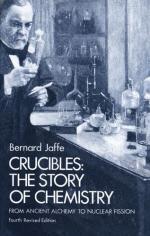|
This section contains 667 words (approx. 3 pages at 300 words per page) |

|
When a neutron strikes the nucleus of certain isotopes, the nucleus breaks apart into two roughly equal parts in a process known as nuclear fission. The two parts into which the nucleus splits are called fission products. In addition to fission products, one or more neutrons is also produced. The fission process also results in the release of large amounts of energy.
The release of neutrons during fission makes possible a chain reaction. That is, the particle needed to initiate a fission reaction—the neutron—is also produced as a result of the reaction. Each neutron produced in a fission reaction has the potential for initiating one other fission reaction. Since the average number of neutrons released in any one fission reaction is about 2.3, the rate of fission in a block of material increases rapidly.
A chain reaction will occur in a block of fissionable material...
|
This section contains 667 words (approx. 3 pages at 300 words per page) |

|


